The Basics of How the Law System Works
The purpose of this post is to show the major building blocks of the “law” system in a simplified way so the big picture can be seen quickly and clearly.
While written from an American point of view, what follows will apply to most “common law” countries around the world. Much detail will be left out to minimize confusion.
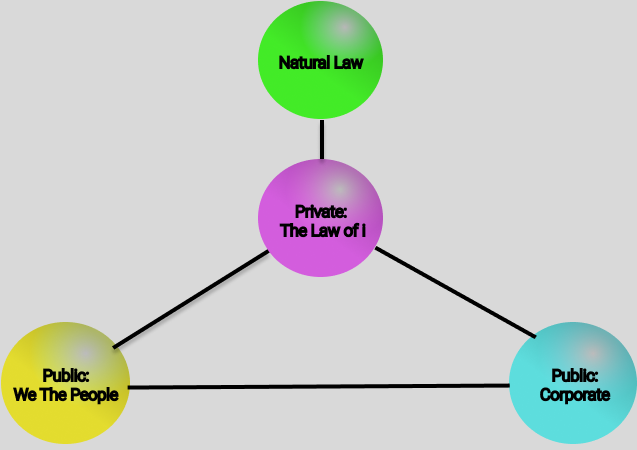
Contents
- Summary
- Law Defined
- Law-Government Concepts
- Natural Law
- Private Law of I
- Public Law – We the People
- Public Law – Corporate
- Lawful vs Legal
- Conclusion
Summary
Law, defined in a general sense, is the rules that govern and maintain the structure of natural or man-made systems.
The diagram above represents four “universes” of law-governing systems that most of us interact with daily. These include;
- Natural
- Private
- Public (we the people)
- Public (corporate)
Each of the above generally has priority over the one below it.
Law, governments, and corporations are three concepts that are very closely related as law tends to define the role, scope, and reach of both governments and corporations.
Governments and corporations are regarded as “legal fictions” as they are a set of ideas held in the minds of men. They are not real, have no substance, and are subservient to the living.
In America and many other countries around the world, governments were originally erected by the will of the people primarily for the protection of individual life, liberty, and property. They were not created to regulate, tax, and control the people.
Private corporate “governments” were later created that appear to be the same as governments created by the people but in reality, are separate and inferior. In time and by legal manipulation, silent consent, and “voluntary” contracts, corporate “governments” have gradually displaced the original governments without the people realizing the difference between the two.
The net effect was to shift the people from governments erected to protect the rights of men and women to those of a corporate nature offering privileges in exchange for those sacred rights. This corporate form of “government” also came with duties, taxes, regulations, permits, licenses, and obligations effectively reducing the status of the people from sovereign to slave on a multitude of levels.
Law Defined
Law, in a general sense, is a set of rules that define and or control a particular system whether natural or man-made.
Law-Government Concepts
Law
In general, acts, statutes, codes, regulations and policies are the instruments by which unincorporated and incorporated governments and corporations themselves are created and defined. The powers, jurisdictional reach, and structure are all described by these various elements.
In the realm of statutory construction, the meaning of words is all important as well as spelling, punctuation, and capitalization. When two words are in any way different, they almost always have different meanings.
As an example, in common usage, the term “person” or “individual” is often used to mean a man or woman but in law, it usually means a legal/fictional entity, often a type of corporation. As a second example, the terms United States and UNITED STATES have different meanings in law, one a municipal government, and the other a corporation. The law must be read very carefully, understanding the definition of all terms to accurately assess their meaning.
Governments
Unincorporated and incorporated governments as well as corporations are known as legal fictions. They are man-made and of the dead. They are only a set of ideas agreed upon by men and women, the living. Of note, one definition of the term corporation is derived from corpus, a dead body, and oration, to speak where corporation means to speak through the dead.
Both unincorporated and incorporated governments establish titles and offices by which their functions are carried out. For government to be able to act in the real world these titles and offices must be given life, occupied by real men and women. Each title and office is strictly defined and regulated by legal acts, statutes, and codes.
Examples of titles include police officer, peace officer, IRS agent, the President of the United States, Governor, Congressman, Attorney General, Magistrate, Judge, citizen, National, Person. Individual, taxpayer, employee, etc. Examples of offices include the Office of the President, the State Department, the Governor’s Office, the Police Department, etc.
Unincorporated governments are created by the will of the people to protect and serve the people, the living. Incorporated governments are created by private interests for the benefit of those private interests and concern themselves with fiction, the dead.
When a man or woman occupies an office or takes on a title, they are bound to all the acts, statutes, and codes that define and govern that office or title, limiting and controlling what they can do. When not acting as title or office holder they return to the status of man or woman where the terms man or woman mean a living being having sovereignty and a superior position over legal fictions like a government or corporation.
Natural Law
In the natural world, there is a fundamental order in the environment we inhabit that defines allowable behavior. This is generally made up of space/time, matter/energy, and fundamental forces such as gravity and electromagnetism.
From these base qualities come higher levels of order which include molecular order, chemical order, biochemical order, and the order allowing biological life.
From biological life comes still higher levels of natural order that include a social order when animals, and at a base level, men and women form groups.
Private Law of I
Sovereignty
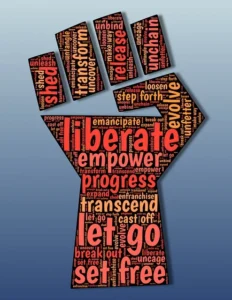 Sovereignty is defined as supreme authority. Sovereignty is a consequence of being born with free will. This quality is generally ascribed to Kings or governments but lesser known is that under the covers in many countries, America in particular, the people, individually and collectively are also sovereign.
Sovereignty is defined as supreme authority. Sovereignty is a consequence of being born with free will. This quality is generally ascribed to Kings or governments but lesser known is that under the covers in many countries, America in particular, the people, individually and collectively are also sovereign.
Private Common Law
Private common law is the law common to I. This is the law sovereign men and women set to govern their own private lives and property. These private rights dovetail with, and can be tempered by, the public common law when interacting with other sovereign men in women
You can learn more by going to this related link: Private Law Common to I
Public Law – We the People
Societies
Societies are generally defined as sovereign men and women who come together of their own free will to form mutually beneficial relationships.
The formation of societies has many advantages such as improved protection of life, acquisition of food, economies of scale, and specialization giving rise to trade and free enterprise all of which serve to improve the lives of each member of a society over time.
Public Common Law
The existence of any mutually beneficial society owes itself to certain basic qualities. Among these are a general respect for the sanctity of life, the right to hold property exclusive of others, trust (your word is your bond), and honor (doing right by others).
These attributes seem to manifest in nearly all man-made societies around the world and can be considered a higher order of natural law governing the health of a society.
Unfortunately, men being of an imperfect nature, often fall short of upholding the above-stated set of values which would give rise to controversies. Left unresolved, this would lead to an unbalanced and dysfunctional society.
In response, the law common to the people slowly evolved to address controversies and seek remedy between sovereign members of the society to reestablish and maintain balance and harmony within the society. This eventually included the introduction of courts, judges, and juries to ensure controversies were resolved fairly and agreed-upon remedies were carried into effect.
The public common law rested on two basic tenets; do no harm and honor your agreements, and was more often an expression of the will of the people rather than a set of written rules.
Government by the People
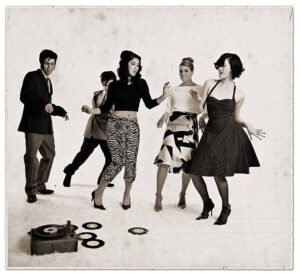 As societies grew in size and complexity into nation-states there arose a need to formalize and extend the rules and common functions a society could or should provide to its members.
As societies grew in size and complexity into nation-states there arose a need to formalize and extend the rules and common functions a society could or should provide to its members.
Governments (a fiction) created by the will of the people (de jure), especially in America after the revolution, were erected and set in place primarily to protect individual life, liberty, and property and to facilitate the resolution of controversy between sovereigns through a court system. This type of government is known as unincorporated.
These governments, beyond their primary duty of protecting individual life, liberty, and property also took on broader issues internal to society and if needed on an international level.
Some key features of Government by the People include:
- Meant to protect the substantive rights of life, liberty, and property of men and women (the living) in a society.
- Embodied in a “republican” form of government of, by and for the people (de jure).
- Has limited, defined powers
- Generally concerned with lawful matters (of the land, the living)
- Employs public servants to serve the people.
- Provides courts for sovereign men and women to resolve controversy and to determine and enforce remedy
Examples of various court decisions affirming the relationship between the sovereign and his or her servant government;
“Sovereignty itself is, of course, not subject to law, for it is the author and source of law; but in our system, while sovereign powers are delegated to the agencies of government, sovereignty itself remains with the people, by whom and for whom all government exists and acts. And the law is the definition and limitation of power.” Woo Lee vs. Hopkins, 118 U.S. 356 1 “People are supreme, not the State.” Waring vs. the Mayor of Savannah, 60 Georgia at 93.
“the government is but an agency to the State,” — the State being the sovereign people.” State vs. Chase, 175 Minn, 259, 220 N.W. 951, 953. “The rights of the individual are not derived from governmental agencies, either municipal, state, or federal, or even from the Constitution. They exist inherently in every man, by endowment of the Creator, and are merely reaffirmed in the Constitution, and restricted only to the extent that they have been voluntarily surrendered by the citizenship to the agencies of government. The people’s rights are not derived from the government, but the government’s authority comes from the people. The Constitution but states again these rights already existing, and when legislative encroachment by the nation, state, or municipality invade these original and permanent rights, it is the duty of the courts to so declare, and to afford the necessary relief.” City of Dallas, et al. vs. Mitchell, 245 S. W. 944, 945-46 (1922).
“The people of the State do not yield their sovereignty to the agencies which serve them. The people, in delegating authority, do not give their public servants the right to decide what is good for the people to know and what is not good for them to know. The people insist on remaining informed so that they may retain control over the instruments they have created.” (Added Stats. 1953, c. 1588, p.3270, sec. 1.) “The people are the recognized source of all authority, state or municipal, and to this authority it must come at last, whether immediately or by circuitous route.” Barnes v. District of Columbia, 91 U.S. 540, 545 [23: 440, 441]. p 234.
“It is not the function of our Government to keep the citizen from falling into error, it is the function of the citizen to keep the Government from falling into error.” American Communications Association vs. Douds, 339 U.S. 382, 442, (1950)
You can learn more by going to this related link: Public Law – We the People
Public Law – Corporate
Government by Corporations
In America, after and as a consequence of the Civil War in the mid-1800s, gross alterations to the US Constitution were made which resulted in the creation of a new and parallel form of corporate de facto (not by the will of the people) “government”.
Public Corporate Law
 This corporate “government” (really a government services corporation), private in nature, was deliberately formed to erode the sovereignty of individual Americans and push aside the de jure government under the guise of freeing black slaves by giving them so-called “civil rights” (really corporate privileges).
This corporate “government” (really a government services corporation), private in nature, was deliberately formed to erode the sovereignty of individual Americans and push aside the de jure government under the guise of freeing black slaves by giving them so-called “civil rights” (really corporate privileges).
This was in part done by creating a titled class called citizens of the United States where the United States was a municipal government-corporation centered in Washington D.C.
Thus began a slow “voluntary” march away from substantive “unalienable” rights of sovereign Americans in exchange for civil/corporate contract-based privileges underpinned by an endless stream of legal acts, statutes, and codes and a debt-based monetary system.
The consequence of this grand alteration was to reduce once-free Americans into a state of “voluntary” slavery, debt, taxation, and all manner of control over one’s life through the use of titled legal fictions.
This corporate government system and its central banking model have since been copied all over the world in various forms.
Some key features of Government by Corporations include:
- Generally known as “legal” and includes acts, statutes, codes, and the legal society (attorneys).
- Involves privileges, benefits, duties, taxes, and obligations.
- Embodied in the form of a private “government services corporation” (de facto).
- Applies generally to legal fictions/titles or the realm of the dead (law of the sea).
- Employs “authorities” to enforce compliance with contracts.
- In most cases contracting with this form of “government” is voluntary.
- In general, contracting with this form of “government” will significantly erode your sovereignty.
- Today the vast majority of people have unknowingly yet deeply tied themselves to this form of “government”
You can learn more by going to this related link: Public Law – Corporate
Lawful vs Legal
From the above, it is important to make the distinction between lawful and legal and rights vs privileges.
Lawful
That which is “lawful” usually refers to the inherent rights of men and women (the living) and is tied to the land (law of the land) and tangible things of substance. Where a right is the free, unencumbered expression of action or the exclusive holding or claim to property. A right cannot by definition be taxed, regulated, or in any way put upon by governments or others of mankind or such right becomes a privilege. Said rights are antecedent to all governments and are “unalienable” as they cannot suffer a lien or be made conditional.
Legal
That which is “legal” usually refers to the realm of fiction (the dead) such as governments and corporations and encompasses contracts and artificial entities and titles (the law of the sea) such as legal “persons”, “citizens”, “individuals”, “residents”, “employees”, “taxpayers”, etc. So-called rights such as “civil rights” are really government or corporate-granted privileges that can be modified or taken away at any time.
Most attorneys are trained to know the “legal” excluding the “lawful” so they are generally unaware of the true substantive rights of the people.
The table below shows just a few contrasting attributes between private/public de jure government (lawful) and that of public corporate de facto government (legal).
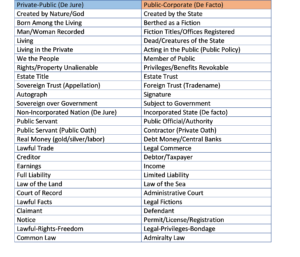
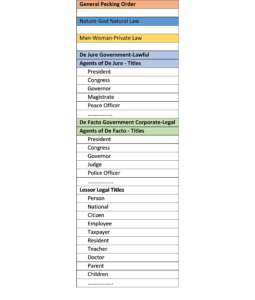
Conclusion
Unfortunately, the average man or woman lives in a world where the nature of law is not taught in corporate public schools with even most attorneys having little understanding of the fundamental underpinnings of the law system, being confined to a world of millions of “legal” corporate acts, statutes, and codes.
The true and full lawful power of the people has been artfully shifted from that of substance (the living) to that of fiction (the dead) and by doing so has disenfranchised the people from being the masters of their de jure governments to slaves of a de facto corporate imposter.
With the proper understanding, you can lawfully adjust your relationship with the corporate government to serve your needs rather than theirs.
